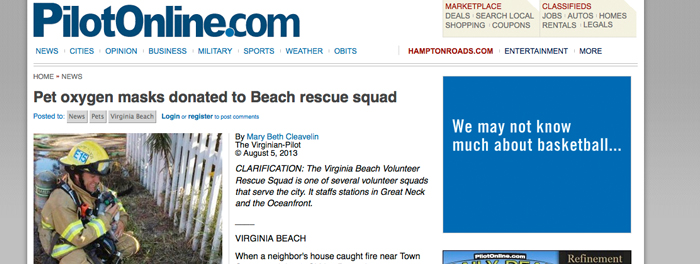When a neighbor’s house caught fire near Town Center on July 13, Shirley Begay knew no one was home, but she worried about a pet in an upstairs bedroom.
“My first thought was the dog,” she said. “It was too smoky for us to go in, so we had to tell the firefighters where to find him.”
Crews from the city’s fire department retrieved the dog and used an oxygen mask designed to fit an animal’s muzzle. He received treatment for 30 minutes on the scene and spent the night recovering in an animal hospital, Begay said.
On Saturday, the Virginia Beach Volunteer Rescue Squad became fully equipped with pet oxygen masks through Invisible Fence Brand’s Project Breathe initiative. The rescue squad received enough small, medium and large masks to supply each of its 10 emergency vehicles.
Invisible Fence – a company that specializes in collars warning animals to stay close to home – has donated more than 10,000 pet oxygen masks to fire departments throughout the United States and Canada, according to the company’s website. The masks cost about $60 each but are free for rescue squads.
“We’re not in the business of rescuing animals, but when there is an emergency that affects the family, we want to do something after we’ve addressed all the people,” said Ellen McBride, a rescue squad emergency medical technician. “That way, we’re helping every family member.”
According to the U.S. Fire Administration, between 40,000 and 150,000 pets die in fires each year.
Having oxygen masks within reach for pets during fires and carbon monoxide poisonings can save lives, said Dr. Wayne Johnson, a veterinarian at Birdneck Animal Hospital.
“Just like with people, the sooner you can get more oxygen in the animal, the better,” he said.
Fire departments in Norfolk, Virginia Beach and Chesapeake have also received pet oxygen masks through donations: In 2007, the Chesapeake Humane Society donated oxygen masks to the Chesapeake Fire Department, and in 2008 and 2009, Animal Rescue of Tidewater donated masks to the Virginia Beach Fire Department and Norfolk Fire-Rescue.
“In the past, you’d pull an animal out and maybe try to fashion a mask out of a human oxygen mask, which doesn’t provide the proper flow of oxygen,” said Capt. Scott Saunders, a Chesapeake Fire Department spokesman. “These have been a huge benefit.”
McBride, who owns two cats, said the squad’s new ability puts her at ease.
“It makes me feel better knowing that if something were to happen to my family, including my pets, the Virginia Beach Rescue Squad has what is needed to save their lives,” she said.
Mary Beth Cleavelin, 757-222-5047, marybeth.cleavelin@pilotonline.com

